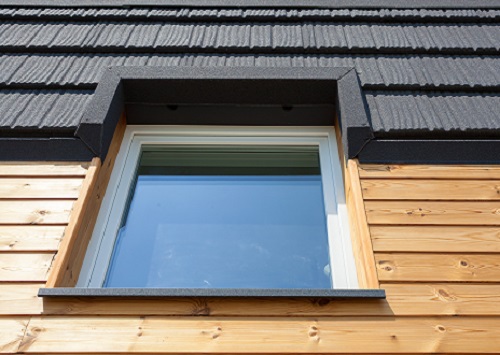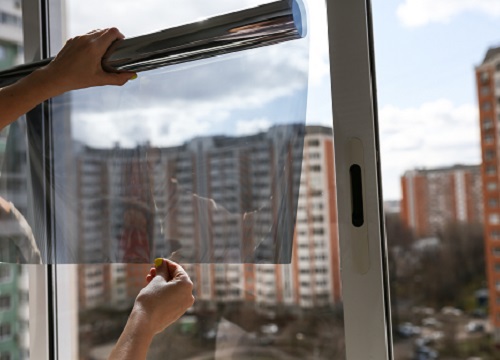The sun’s ultraviolet rays can harm skin and damage interiors. Without UV protection, your furniture, upholstery, carpets and draperies are at a higher risk of fading over time. As windows let in sun, installing solar screens or window films can reduce heat, lower your AC bills and protect interiors from damage.
But which option is better? Let’s find out.
Should You Choose Solar Screen Shades or Window Films?
Here’s a rundown of their benefits and limitations to help you choose the best one for your home.
A. Solar Screen Shades

Solar screen shades are window treatments made using special window mesh. This is mainly a polyester weave or fibreglass coating which sometimes comes with the added durability of PVC coating. They are finished in varying materials, making them a stable and durable option. Mainly installed on the outside of windows, they’re also an effective way to block sunlight. This aids in keeping the temperature inside from rising. Moreover, they offer privacy, with many varieties to match your decor. Solar shades are an inexpensive solution to shield your home from the sun’s heat and glare.
The shades are typically fabricated as roller shades, which can be wound up on a spindle at the top of your windows. The roll can be hidden within a ‘cassette’ to create a sleek appearance. Alternatively, they’re available in Roman shade options that fold when raised.
In both styles, the window coverings are made of either perforated or woven fabric.
Here are some advantages and disadvantages of solar screen shades.
ADVANTAGES:
- Possible Cost Savings
Adding solar screen shades can reduce the energy needed to cool your home in summer. Precisely how much you save depends on how many windows you cover and the difference in temperature between outside and in. Additionally, these window shades are more cost-effective than most new high-efficiency window treatments.
- Anti-Glare Properties
No matter where your house is located, these shades work wonders in terms of being convenient and comfortable. They reduce glare, offering respite to both your eyes and screens, including televisions, tablets, laptops and smartphones.
- Energy Conservation
With glare and heat reduced in summer, the temperature in your house will be regulated. This allows you to reduce fan and AC usage. This can be beneficial for the environment as air conditioner usage contributes to global warming.
- Wide Variety Available
Solar shades may seem pricey, but they’re economical in the long run. They’re also available in a wide range of designs, shapes and sizes, allowing you to spruce up any room.
DISADVANTAGES
The main disadvantage of solar shades is perhaps the misconception of their characteristics. Though they effectively filter UV light, they’re not a complete blackout solution, although they do offer some privacy during the day.
B. Window Films
Window films are bonded to the glass to diffuse UV rays. They offer many benefits, making them an option worth considering.
Their usage can be divided into three categories: decorative, security and solar.
But not all window films are created equal. Each kind offers various benefits. Adding the right film is a major investment so consider these advantages and disadvantages before choosing one for your home.
ADVANTAGES
- UV Protection
Using a window film will help protect your furnishings and fabrics from discolouration and fading by keeping out up to 99% of harmful UV rays, thus extending their lifespan.
- Reduced Utility Bills
Window films prevent heat from getting inside, meaning you won’t need fans and AC as much, thus reducing your summer utility bills .
DISADVANTAGES
Although window films reduce your summer utility bills by blocking the sun, you’re doing the same in winter. That means you’ll have to compensate by running the heater for longer periods. Additionally, by offsetting the light that comes into your home, you’ll have to turn on more lights, which also affects energy consumption.
C. Similarities
- Goals
Both solar screen shades and window films aim to accomplish the same task: to protect your possessions from sun damage and block out harmful UV rays that destroy them. They also keep your interiors cooler than other window treatments.
- Visibility
Both methods offer a clearer view outside than any other window treatment.
D. Differences
- Installation
A key difference is the way they’re installed. Solar screen shades are mainly installed on the outside and are slightly raised from the window structure, like insect screens. Window film needs to be applied directly to the inside glass to prevent them from coming off due to high winds or rain.
- Value for Money
Solar screens should ideally last between two to five years which makes them a great investment. They reduce energy consumption, thereby reducing utility bills up to 25% year-round. When professionally installed, they’re less expensive than window film, offering great value for money. However, as mentioned , window film won’t help you save in winter. This makes them an idea worth reconsidering when thinking of methods to keep out heat and glare.
- Efficiency
Sun screen shades are a lot more effective at reducing heat transfer than window films. Since they’re installed on the outside of windows, they prevent heat from ever reaching them, thus reducing the interior temperature. But the outside of the window is exposed to the sun’s rays, allowing them to absorb heat. Another major difference in terms of efficiency is that sun screen shades can be used whether your windows are open or closed. Films are only effective when windows are kept closed.
When thinking of the differences between solar screen shades and window films, the former seems a better and more effective option. But the decision comes down to your preferences and requirements. We hope we’ve shed some light on the advantages and drawbacks of both methods. So, which is best for you?

